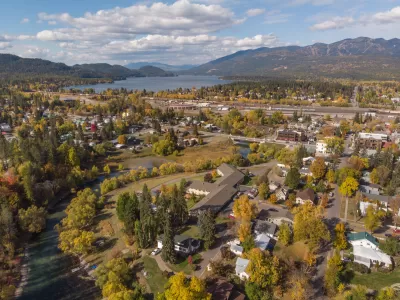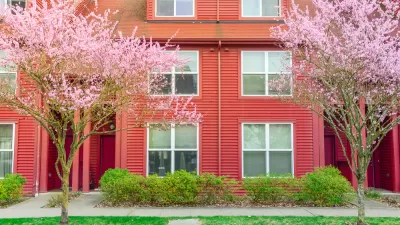The decision reverses new laws once dubbed the ‘Montana Miracle.’

A Montana judge reversed parts of a sweeping zoning reform package passed last year which would have legalized accessory dwelling units and duplexes in residential areas. According to the judge, the laws would “likely do ‘irreparable’ damage to residents of single-family neighborhoods.” Writing in Reason, Christian Britschgi calls the decision ‘eyebrow-raising,’ noting that “the reforms rank as some of the more ambitious housing bills passed by any state legislature last year.”
The decision is the result of a lawsuit brought by a group calling themselves Montanans Against Irresponsible Densification (MAID), which sued the state arguing that the zoning reforms were unconstitutional because they allowed neighborhoods with restrictive covenants to continue excluding denser housing types. “MAID said this would unfairly funnel development into areas without protective covenants, and produce arbitrary results whereby duplexes could be built on one side of a street, but not on the other side.”
This reversal of recent zoning reforms isn’t unique to Montana: “In September 2023, a Minnesota judge overturned Minneapolis' first-in-the-nation abolition of single-family-only zoning (in addition to other zoning reforms), citing the city's failure to conduct a proper state-required environmental analysis of increased allowable density,” and a Texas judge similarly invalidated zoning reforms in Austin.
With more Americans unable to afford housing, evictions on the rise, and housing supplies not meeting demand in many regions, the zoning reform and missing middle housing’ debate isn’t going anywhere soon.
FULL STORY: Court's Wild Zoning Decision Blocks 'Montana Miracle'

Alabama: Trump Terminates Settlements for Black Communities Harmed By Raw Sewage
Trump deemed the landmark civil rights agreement “illegal DEI and environmental justice policy.”

Planetizen Federal Action Tracker
A weekly monitor of how Trump’s orders and actions are impacting planners and planning in America.

Why Should We Subsidize Public Transportation?
Many public transit agencies face financial stress due to rising costs, declining fare revenue, and declining subsidies. Transit advocates must provide a strong business case for increasing public transit funding.

Understanding Road Diets
An explainer from Momentum highlights the advantages of reducing vehicle lanes in favor of more bike, transit, and pedestrian infrastructure.

New California Law Regulates Warehouse Pollution
A new law tightens building and emissions regulations for large distribution warehouses to mitigate air pollution and traffic in surrounding communities.

Phoenix Announces Opening Date for Light Rail Extension
The South Central extension will connect South Phoenix to downtown and other major hubs starting on June 7.
Urban Design for Planners 1: Software Tools
This six-course series explores essential urban design concepts using open source software and equips planners with the tools they need to participate fully in the urban design process.
Planning for Universal Design
Learn the tools for implementing Universal Design in planning regulations.
Caltrans
Smith Gee Studio
Institute for Housing and Urban Development Studies (IHS)
City of Grandview
Harvard GSD Executive Education
Toledo-Lucas County Plan Commissions
Salt Lake City
NYU Wagner Graduate School of Public Service





























